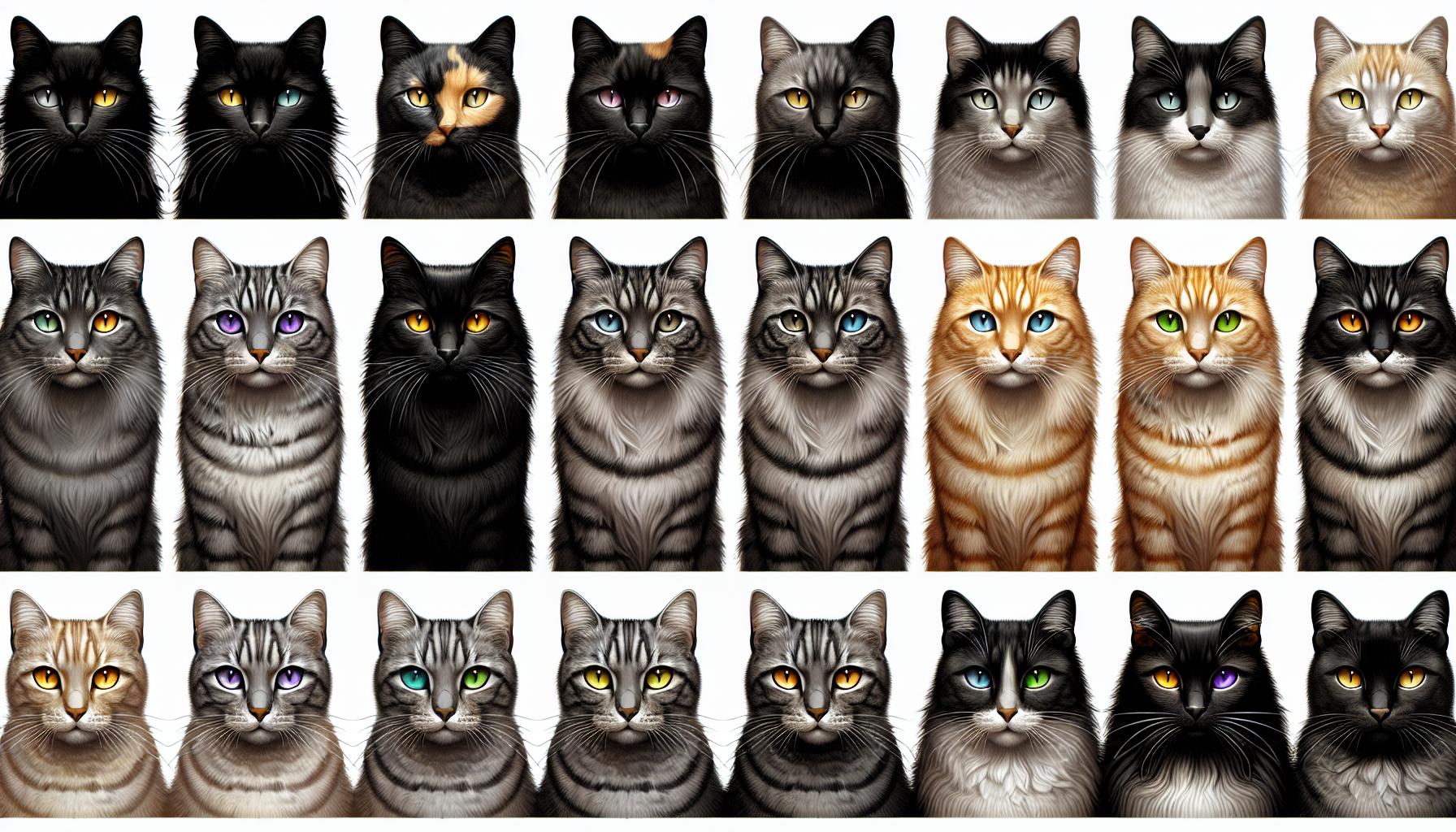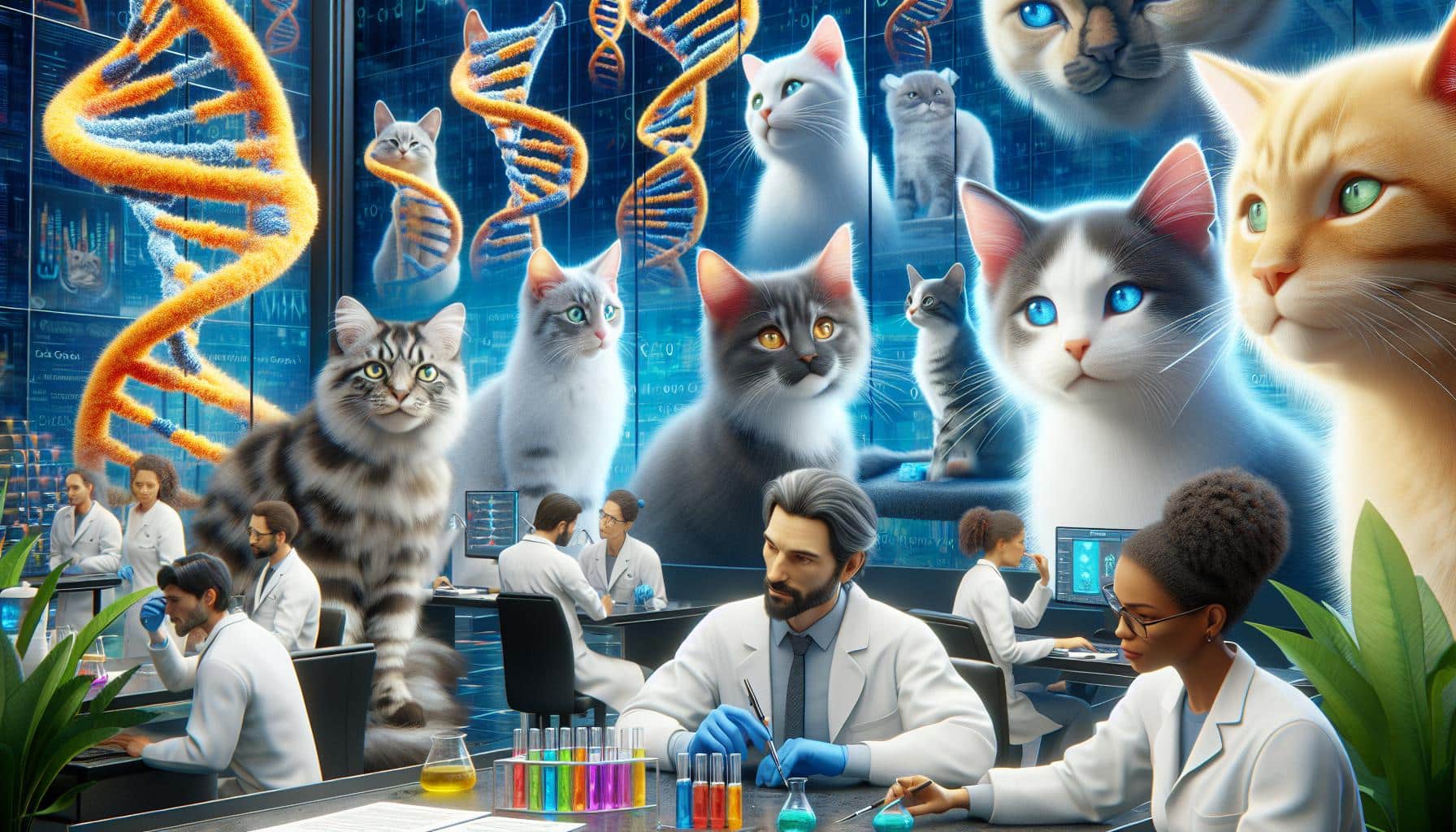Ever wondered about the fascinating world of kitty genomics traits? Have you ever marveled at the unique characteristics that make your feline friend so special? In this article, we delve into the genetic makeup of our beloved kitties and explore the traits that make them the adorable companions they are. From their coat colors to their playful personalities, a cat’s genetics play a significant role in shaping who they are.
Understanding kitty genomics traits not only gives us insight into the physical attributes of our cats but also sheds light on their behavior and health tendencies. By uncovering the genetic factors behind certain traits, we can appreciate our furry friends on a whole new level. So, join us on this genetic journey as we unravel the mysteries behind the enchanting world of kitty genomics traits.
Understanding Kitty Genomics Traits
The Science Behind Feline Genetics
When looking into the world of kitty genomics traits, it’s fascinating to delve into the intricate science behind feline genetics. Cats inherit their traits, both physical and behavioral, through their genetic makeup. This genetic information is passed down from one generation to the next, influencing various aspects of a cat’s appearance, personality, and health tendencies. By understanding the science behind feline genetics, you can appreciate the complexity and beauty of how these traits are encoded within each furry friend.
Decoding the Feline Genome
Decoding the feline genome reveals the blueprint that defines a cat’s unique characteristics. Each cat’s genetic code plays a significant role in determining its physical features, such as coat color, pattern, and ear shape, as well as behavioral traits like playfulness, sociability, and hunting instincts. By unraveling the mysteries of the feline genome, researchers can gain insights into the hereditary basis of different traits and behaviors exhibited by cats. This decoding process sheds light on the genetic variations that contribute to the diversity seen among our feline companions.
Key Traits in Cats Determined by Genetics

Understanding the genetic basis of key traits in cats sheds light on how these furry companions inherit and exhibit various characteristics. By decoding the feline genome, researchers can unravel the blueprint behind a cat’s unique features. Let’s explore how genetics influence fundamental traits in cats.
Coat Color and Patterns
Genetics play a crucial role in determining a cat’s coat color and patterns. Each cat inherits genes from its parents that dictate the pigmentation of its fur. For instance, a cat’s coat color can be black, white, orange, or a combination of these colors based on the genes it carries. The patterns on a cat’s coat, such as stripes, spots, or solid color, are also influenced by genetic factors. By examining the genes responsible for coat color and patterns, researchers can predict the potential outcomes of breeding certain cat breeds.
Eye Color Variations
Similar to coat color, a cat’s eye color is also determined by genetics. The genes that control eye color produce a range of shades, including blue, green, yellow, and brown. Certain cat breeds are more likely to have specific eye colors due to their genetic makeup. For example, Siamese cats are known for their striking blue eyes, a trait that is passed down through generations. Understanding the genetic mechanisms behind eye color variations in cats enhances our knowledge of feline genetics and helps predict the eye colors of offspring in breeding programs.
Physical Build and Size
The physical build and size of a cat are influenced by a combination of genetic factors. Different cat breeds exhibit distinct body structures, sizes, and proportions based on their genetic heritage. For example, the slender and graceful Siamese cat has a different body type compared to the robust and muscular Maine Coon. Genetic mutations and variations contribute to the diverse range of physical characteristics seen in cats worldwide. By studying the genetic markers associated with body size and build, researchers can gain insights into the hereditary traits that define various cat breeds.
Behavioral Traits
Cats’ behavioral traits, such as temperament, sociability, and activity levels, are also shaped by genetics. Certain genes influence a cat’s predisposition towards being playful, affectionate, or independent. Behavioral traits can be inherited from parents and contribute to the unique personalities of individual cats. For example, breeds like the Abyssinian are known for their active and curious nature, traits that are genetically ingrained. Understanding how genetics influence behavioral traits in cats can help pet owners cater to their feline friends’ specific needs and preferences.
Exploring the genetic determinants of key traits in cats provides valuable insights into the complex world of feline genetics. By delving into the genetic basis of coat color, eye variations, physical build, and behavioral traits, we gain a deeper appreciation for the diverse characteristics that make each cat unique. Genetics play a pivotal role in shaping the appearance, behavior, and health of our feline companions, highlighting the intricate interplay between nature and nurture in the realm of kitty genomics traits.
Health Implications of Feline Genetics
Genetic Disorders in Cats
Understanding the genetic makeup of your feline companion is crucial, as it can shed light on potential genetic disorders that may impact its health. Certain genetic mutations in cats can lead to inherited conditions that range from mild to severe. For instance, some breeds are predisposed to conditions like hypertrophic cardiomyopathy, polycystic kidney disease, and progressive retinal atrophy. These disorders can affect a cat’s quality of life and lifespan significantly.
To illustrate, Siamese cats are known to have a genetic predisposition to developing progressive retinal atrophy. This condition can lead to impaired vision and blindness over time. By being aware of these genetic susceptibilities, you can take proactive measures such as regular check-ups and screenings to monitor your cat’s health effectively and intervene early if needed.
The Role of Genetics in Feline Longevity
Genetics play a vital role in determining the lifespan of a feline companion. Cats inherit various traits, including genetic factors that influence their longevity. While proper care and nutrition are essential, genetics also significantly impact how long a cat may live. By understanding your cat’s genetic background and any potential predispositions to certain conditions, you can tailor their care to promote a healthy and extended lifespan.
For example, the Maine Coon breed is known for its robust genetic makeup that contributes to its longevity. With an average lifespan of 12-15 years and some individuals living up to 20 years or more, genetics play a substantial role in the longevity of these felines. By considering your cat’s genetic predispositions and providing appropriate healthcare, you can potentially enhance their quality of life and increase their lifespan.
Being aware of the genetic implications on your cat’s health and longevity is essential for responsible pet ownership. By understanding how genetics influence various aspects of your cat’s well-being, you can take proactive steps to ensure they live a healthy and happy life. Regular veterinary care, genetic screenings, and tailored interventions based on their genetic makeup can make a significant difference in promoting the overall health and longevity of your beloved feline companion.
Advances in Feline Genetics Research
The Impact of Genome Mapping on Cat Breeds
Genome mapping has revolutionized the understanding of cat breeds and their unique genetic makeup. By decoding the entire genetic material of various feline populations, researchers can pinpoint specific genes responsible for distinct physical traits and behaviors. For instance, genome mapping has elucidated the genetic basis of coat color variations in cats, shedding light on the inheritance patterns of these traits across different breeds.
Tailoring Feline Care Through Genetic Knowledge
Understanding the genetic predispositions of your feline companion can significantly impact the way you care for them. By leveraging genetic knowledge, veterinarians can develop personalized healthcare plans tailored to your cat’s specific needs. For example, knowing your cat’s genetic susceptibility to certain diseases can help you proactively manage their health through targeted screenings and preventative measures. Additionally, genetic insights can guide decisions on nutrition, exercise, and overall wellness strategies to ensure your cat leads a healthy and fulfilling life.
By staying informed about the latest advances in feline genetics research, you’ll be well-equipped to provide optimal care for your beloved pet and enhance their quality of life.
Ethical Considerations in Genetic Testing for Cats
The Pros and Cons of Genetic Testing
When considering genetic testing for your cat, there are several pros and cons to be aware of. Understanding these aspects can help you make an informed decision regarding your cat’s health and well-being.
Pros:
- Early Disease Detection: Genetic testing can identify potential health issues early on, allowing for proactive management and treatment.
- Tailored Healthcare: With genetic information, veterinarians can develop personalized healthcare plans based on your cat’s genetic predispositions.
- Informed Breeding Practices: Breeders can make more informed decisions regarding mating pairs and avoid passing on hereditary diseases.
Cons:
- Emotional Impact: Learning about potential health concerns through genetic testing can be emotionally challenging for pet owners.
- Cost: Genetic testing can be expensive, which might be a barrier for some cat owners.
- Accuracy Concerns: There can be limitations in the accuracy of genetic testing results, leading to potential misunderstandings or misinterpretations.
The Future of Feline Genetics and Breeding Practices
The future of feline genetics and breeding practices is shaped by advancements in technology and ethical considerations. As the field continues to evolve, here are some key areas to watch in the coming years:
- Precision Breeding: With the knowledge gained from genetic testing, breeders can engage in precision breeding to enhance desirable traits while minimizing genetic diseases.
- Ethical Breeding Standards: Increasing awareness of genetic issues in specific cat breeds has prompted discussions on ethical breeding practices to ensure the health and well-being of future generations.
- Genomic Research: Ongoing genomic research will further unravel the mysteries of feline genetics, leading to breakthroughs in understanding complex traits and behaviors.
Stay informed about the latest developments in feline genetics to make well-informed decisions regarding your cat’s care and breeding practices. By staying abreast of emerging trends and ethical considerations, you can contribute to the responsible management of genetic testing in the feline community.
Conclusion
Understanding the intricate world of kitty genomics unveils a fascinating realm where genetics dictate physical traits, behavior, and health predispositions. Genome mapping has revolutionized the landscape of feline genetics, offering insights into tailored care strategies based on genetic blueprints. Ethical considerations surrounding genetic testing underscore the importance of informed decisions for your cat’s well-being. As technology advances and ethical standards evolve, staying abreast of feline genetics developments becomes paramount for responsible cat care and breeding practices. Embrace the knowledge of feline genetics to provide personalized healthcare, proactive disease management, and informed choices for your feline companion’s optimal health and happiness.
Frequently Asked Questions
What influences a cat’s physical attributes and behavior?
A cat’s physical attributes and behavior are influenced by its genetic makeup, which determines traits like coat color, eye color, physical build, and behavioral tendencies. These genetic factors are inherited from one generation to the next, impacting how a cat looks, behaves, and its health tendencies.
How has genome mapping impacted feline genetics research?
Genome mapping has revolutionized feline genetics research by decoding the genetic material of cat breeds. It helps identify specific genes responsible for physical traits and behaviors in cats, leading to tailored feline care based on genetic predispositions. This knowledge enables personalized healthcare plans, proactive disease management, and informed decisions on nutrition and wellness strategies.
What are the pros and cons of genetic testing for cats?
Genetic testing for cats offers insights into their health predispositions, allowing for proactive disease management and tailored healthcare plans. However, it also raises ethical considerations regarding privacy, consent, and potential emotional impact. Understanding the pros and cons of genetic testing is crucial for making informed decisions about a cat’s health and well-being.








